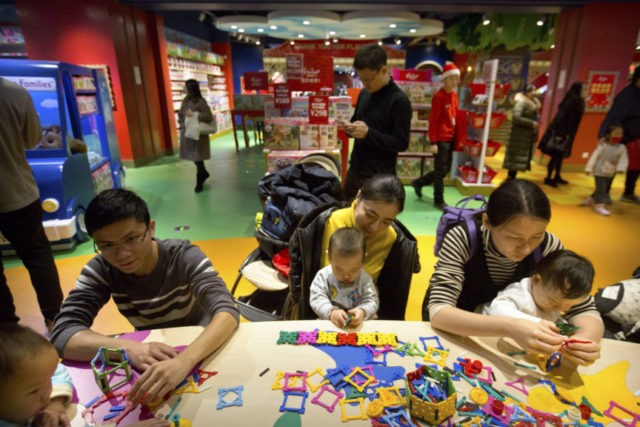A Chinese academic report published this week suggested the nation should begin taxing all adults under 40 and using their money for a “reproduction fund” that would benefit families with more than one child in an attempt to raise birth rates, triggering widespread outrage.
China imposed a “one-child policy” for decades, forcing women to abort subsequent pregnancies or sterilizing them to avoid their families growing larger. A combination of the imposition of this policy and a preference among Chinese parents for male children has led to a steep decline in population growth, as most families are accustomed to being small and the population of women of child-bearing age has dwindled. Chinese state media suggests that the number of women who are capable of having children will drop by 40 percent within the next ten years.
The “reproduction fund” tax is the latest experience suggested for turning the population tide, which could significantly damage the Chinese economy by reducing the workforce size in the near future.
According to the Global Times, a government-run newspaper, the recently-published report by Nanjing University professors warned that China must “immediately remove birth limits as a short-term response” to the impending demographic disaster. China still retains a “two-child policy,” imposed in 2016, but most families have chosen to opt out of a second pregnancy. Birth rates have declined since the expanded permissions for having children. While Communist Party demographers hoped the birth rate would rise to 20 million in 2017, they actually declined to 17 percent and have continued to drop in 2018.
“The report also proposed to establish a fertility fund where citizens under the age of 40 would be required to contribute to the fund every year until they have two children,” the Global Times notes. “They can withdraw their money and a subsidy supported by the government when they have their second child or beyond. Some netizens, however, consider the recommendation unfair for families who prefer not to have a second child.”
The South China Morning Post, which is not state-run, compiled the outraged reactions of both experts and young couples to the proposal that they may face a punitive tax for not having at least two children.
“The choice of whether or not you have a baby is a family’s decision to make. We can encourage people to have babies with incentives but not by forcing taxes on everyone. This would be a violation of human rights, just like it was when we used to limit the population,” Huang Rongqing, former head of the population and economics institute at Capital University of Economics and Business in Beijing, told the newspaper. “I was really surprised that such well-educated professors could come up with such a wacky proposal.”
One mother, Dora Li, told the newspaper that the proposal may actually trigger more of a population drop rather than increase the age of youth, saying, “Many mothers were forced to go overseas to have a second baby because of the one-child policy. If this proposal goes ahead, then I guess many more would have to leave in order not to have another kid.”
The outcry is the loudest to the wide array of brainstormed proposals the Chinese government has begun to publicly consider in its state media since the beginning of the year, when the dire news about the decline of the nation’s birth rate was published. In Jianxi province, authorities announced in June that they would implement policies making it more difficult for families to abort baby girls in an attempt to increase the future population of women of child-rearing age. Thanks to the prolonged implementation of the one-child policy, many families are used to aborting daughters until they conceive a son. The result of that preference is a population in which there are 34 million fewer women than men nationwide.
Not all suggested measures are punitive. In July, officials in Liaoning Province proposed offering financial incentives to couples to get them to have a second child. Among them would be expanded maternity leave and “preferential policies in taxes, education, social welfare and housing,” according to the People’s Daily. Also last month, at least one Chinese company began responding to the government’s demands to make childbearing easier by offering women on staff expanded maternity benefits, including funding for freezing their eggs to allow for future reproduction.
The online travel agency Ctrip reportedly “said it will offer from 100,000 yuan ($15,000) to 2 million yuan for egg preservation, as well as a seven-day paid leave for female managers at the middle and senior levels,” according to the Global Times.

COMMENTS
Please let us know if you're having issues with commenting.